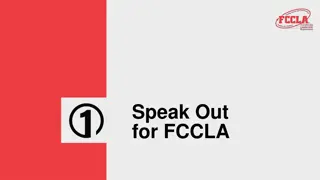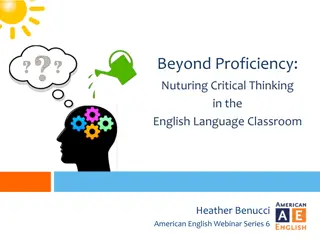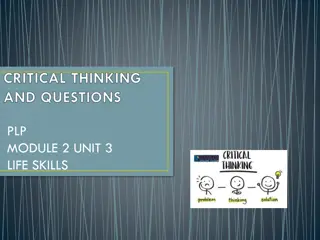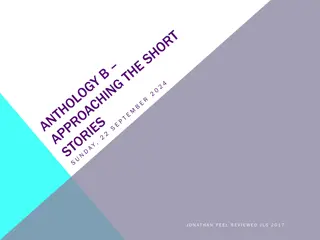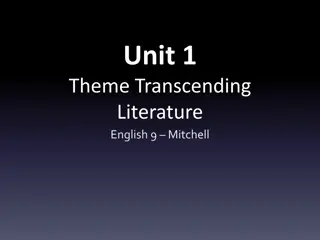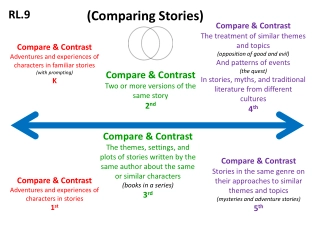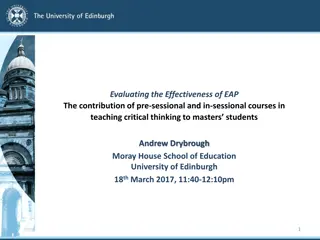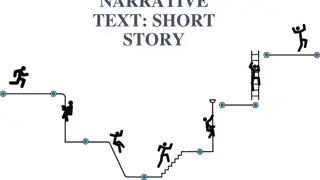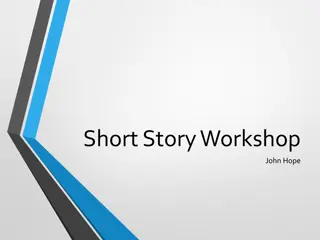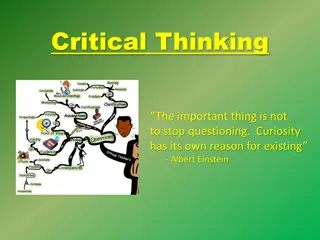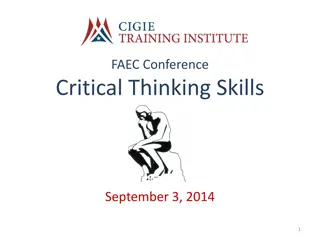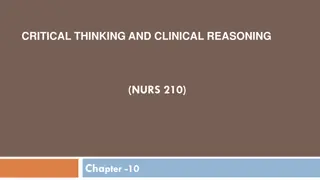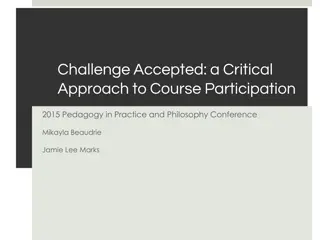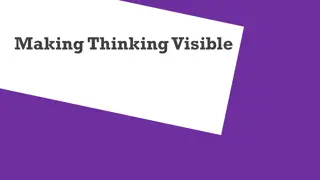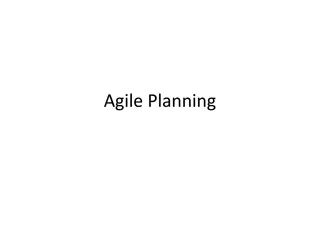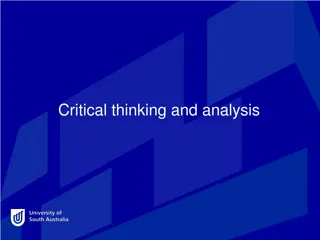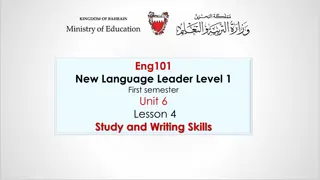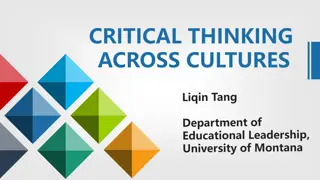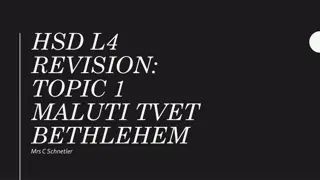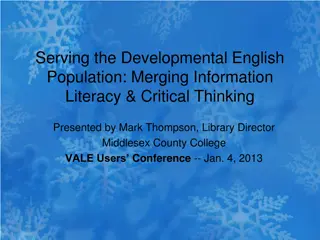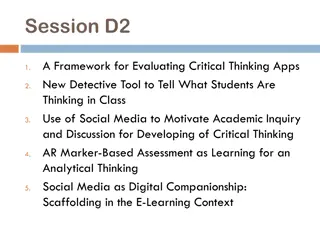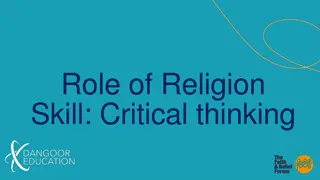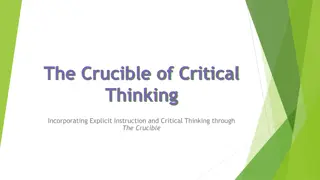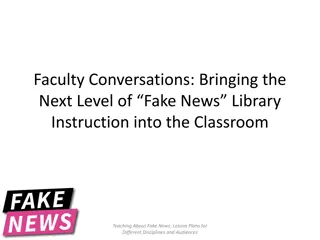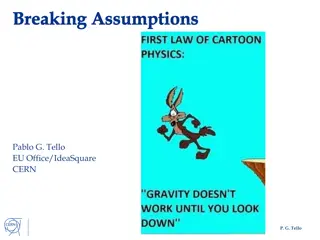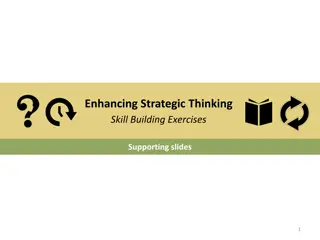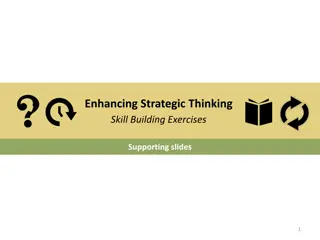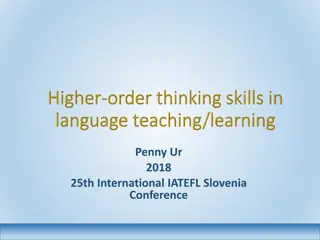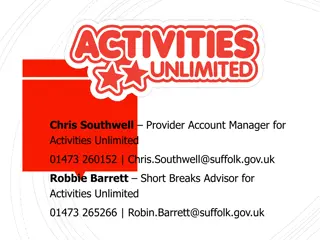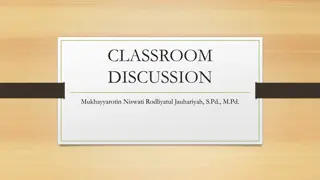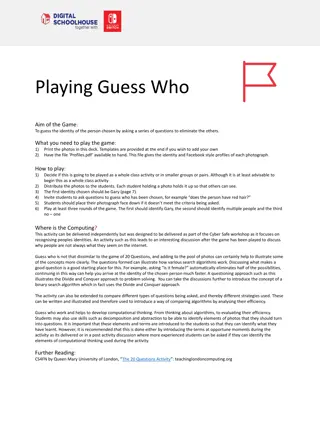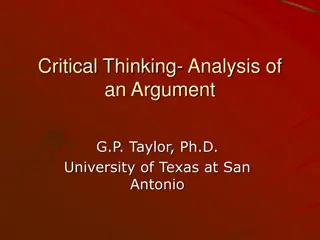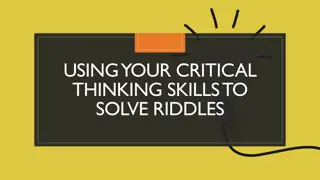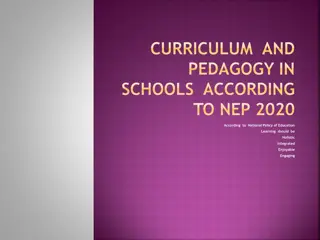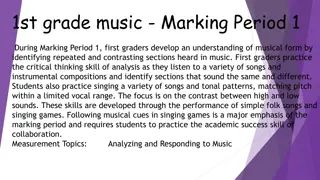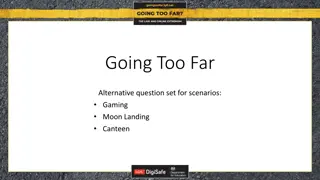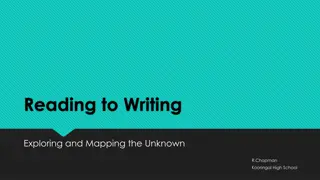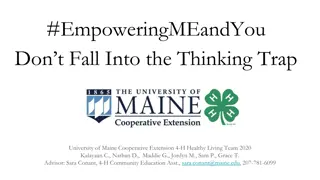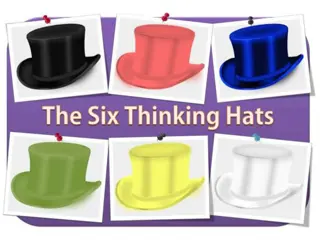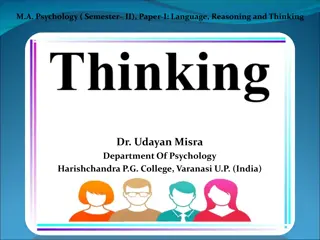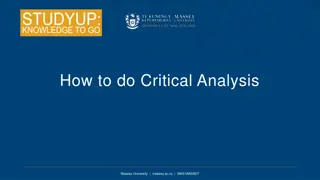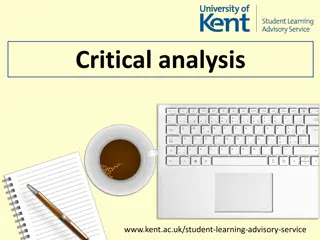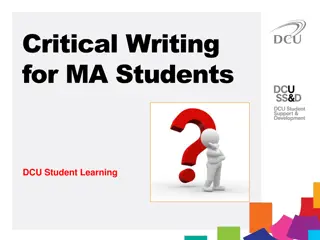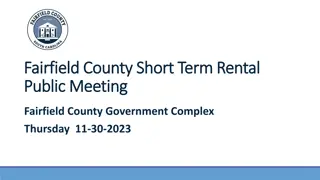Engaging with Critical Thinking in Short Stories
Explore different ways of responding to short stories, from diary entries to role-playing, while honing critical thinking skills like deductive and inductive reasoning. Delve into character analysis, themes, and personal reflections to enhance understanding and engagement with the author's work.
Download Presentation

Please find below an Image/Link to download the presentation.
The content on the website is provided AS IS for your information and personal use only. It may not be sold, licensed, or shared on other websites without obtaining consent from the author. Download presentation by click this link. If you encounter any issues during the download, it is possible that the publisher has removed the file from their server.
E N D
Presentation Transcript
Welcome Back to the Short Story Module Welcome Back to the Short Story Module In this Semester we want to learn: Thinking critically about the stories and about our responses to them. Responding to the stories in various forms including: diary entry, response journal, writing letter, reading log, rewriting a story from another characters point of view, providing a continuation to a story, role playing, and designing poster. Practicing the 5 critical thinking skills; inductive reasoning, deductive reasoning, analysis and interpretation, making inference, as well as evaluation and explanation.
Write a diary entry stating your experience with the story. What did you learn from this story? What do you think the value and beliefs of this author to be? Do you like this author be one you like to have influence your students or your children in the future? Why or why not? Write a response journal on the story you have read that include: 1- A brief summary of the major events that influence the story s development. 2-Description of the main character. Note that characters could be described based on the following aspects: Physical Intellectual Emotional Social 3- Emerging themes. Themes are ideas, characteristics, or symbols that surround characters or events and create strands that hold the tapestry of the story together. Themes are concepts that usually recur throughout the book. 4- your feelings and reactions to what you read and any questions about things that are confusing or contradictory. Write a letter to each of the following characters in the story. Tell him/her what you wish to tell him expressing your real feelings toward him/her. Would you like to advice that character, for example? How would the story be different if the character took the advice? Reading log: example, which part of the story do you like? Why? Explain. Which part of the story you do not like? Why? Explain. Providing a continuation to the story: example, create a scene when Laurie s mother first sees Laurie after the PTA meeting. Role playing: acting out the story in group. Designing poster: on rewriting a story from another characters point of view. For example, How would the story be if Laurie s mum/Laurie s teacher was the narrator of the story?
Critical Thinking Skills Critical Thinking Skills Deductive Reasoning (top-down thinking) Deductive reasoning is a process that moves from a general statement believed to be true to a more specific conclusion. The following is a formula often used in deduction: If A = B and B = C, then in most cases A = C. Example: All children like pizza. Ali is a child. Therefore, Ali likes pizza. Inductive Reasoning (bottom-up thinking) Inductive reasoning is a process that moves from specific facts, observations, or experiences to a general conclusion. You use inductive reasoning in your writing when you want to lead readers from a series of specific observations to a general conclusion. Drawing inferences about what is true based on prior experience. Some examples in our daily life: I got coffee once at the cafe and it was horrible, so all of their coffee must be terrible. She s been married twice and divorced twice; she must be a difficult wife. This winter is colder than ever, therefore global warming must not be real.
Analysis: Introduce your point in one or two clear topic sentences. Provide evidence that supports the main topic in order to convince the reader of the stated point of view. Distinguish between descriptive writing and analytical writing. Descriptive writing answers the "who," "what," "where," and "how" questions. It often tends to summarize the text. Analytical writing, however, answers to the "why" question. When you consider the question, "Why is this point important?", it pushes you beyond mere description into ideas that are convincing, argumentative, and defend a position. Write a conclusion- focus on concluding with what you hope to get out of your analysis, or provide closure to the topic. Provide your own opinion and reflection about your process of analyzing the text.
Interpretation Categorization Decoding significance Clarifying meaning Inference Using what you know to make a guess about what you do not know or reading between the lines. Use the clues in the text along with your own experiences to help you figure out what is not directly said. Evaluation Assessing claims (recognizing the factors affecting the credibility, relevance, and acceptability of information or opinion) Assessing arguments (determine whether an argument relies on false or doubtful assumptions) determining the level of acceptability, for example Stating the results of one s reasoning.
Explanation Justifying procedures (justifying that reasoning) Presenting reasoning in the form of clear arguments (agree or disagree)
Out Out- -class activities (5 marks for each) (the due date for submitting each work is 2 class activities (5 marks for each) (the due date for submitting each work is 2 weeks) weeks) The activities will be assessed according to a rubric presented by the end of : The activities will be assessed according to a rubric presented by the end of : 1- Role playing (due date is 13th Feb) In a group of 5 students, read a short story that you like. Act out the story. Record yourselves while you are playing roles (acting). Then send me your video for the assessment. 2- Designing Poster (due date is 3rd Mar) In a group of 5 students, design a poster rewriting the story that you acted out from another character s point of view. Draw some pictures to illustrate the new story (it is new since it is narrated from another character's point of view). Use A3 sized paper for the poster. 3- Reflective Writing (due date is 10th Mar) Write an essay in your notebook, reflect on what you have done in the aforementioned activities (role playing and designing poster). Kindly take the following tips into consideration:
Reflective writing is more personal than other types of academic writing. You can use the first person (I ... , My ... , etc.) and explain how you felt. Think about the experience in detail. Explain what went well and what was challenging, and say what you learned in the process. Use a structure: Short introduction to the situation, what happened, what is being examined Evaluate the most important things about the experience, including solutions to problems Say what you would do differently next time Say what you learned overall. Keep the focus on your learning process and what you will do better in future.
Reading Log Questions Reading Log Questions Read the story carefully. Attempt to answer the following questions while you are reading the story Read the story carefully. Attempt to answer the following questions while you are reading the story Chose at least three phrases or sentences which you think are especially important to the story. Explain why? Who is your favorite character in the story? Why? What qualities/traits in that character? What is his/her role (function) in the story? Who is your disfavored character in the story? Why? What qualities/traits in that character? What is his/her role(function) in the story? Compare those two characters in the story? Which part of the story do you like? Why? Which part of the story do you not like? Why? Is the language of the story easy to understand? Did you notice any uncommon expression, word, phrase, or difficult grammatical structure? Do the characters speak like normal people? Do the descriptions of people, places, and events like real life? Give reasons
A Rubric for Assessing your Performance A Rubric for Assessing your Performance Strong 4: Consistently does all or almost all of the following: Accurately interprets evidence, statements, graphics, questions, etc. Identifies the most important arguments (reasons and claims) pro and con. Thoughtfully analyzes and evaluates major alternative points of view. Draws warranted, judicious, non-fallacious conclusions. Justifies key results and procedures, explains assumptions and reasons. Fair-mindedly follows where evidence and reasons lead. Acceptable 3: Does most or many of the following: Accurately interprets evidence, statements, graphics, questions, etc. Identifies relevant arguments (reasons and claims) pro and con. Offers analyses and evaluations of obvious alternative points of view. Draws warranted, non-fallacious conclusions. Justifies some results or procedures, explains reasons. Fair-mindedly follows where evidence and reasons lead.
Unacceptable 2: Does most or many of the following: Misinterprets evidence, statements, graphics, questions, etc. Fails to identify strong, relevant counter-arguments. Ignores or superficially evaluates obvious alternative points of view. Draws unwarranted or fallacious conclusions. Justifies few results or procedures, seldom explains reasons. Regardless of the evidence or reasons, maintains or defends views based on self-interest or preconceptions. Significantly Weak 1: Consistently does all or almost all of the following: Offers biased interpretations of evidence, statements, graphics, questions, information, or the points of view of others. Fails to identify or hastily dismisses strong, relevant counter-arguments. Ignores or superficially evaluates obvious alternative points of view. Argues using fallacious or irrelevant reasons, and unwarranted claims. Does not justify results or procedures, nor explain reasons. Regardless of the evidence or reasons, maintains or defends views based on self-interest or preconceptions. Exhibits close-mindedness or hostility to reason.
The Fun They Had The Fun They Had Isaac Asimov Isaac Asimov (1920 (1920- -1992) 1992)
What if this robot was teaching you today? What would your reaction be? How would our class be different?
Schema Schema Activation Questions Activation Questions Thinking Before You Read Thinking Before You Read What do you like about school the way it is know? What don t you like about it? Would you like to study without going to a school? Explain what you like or do not like about this type of education. Do you think it is possible to learn without reading books? Explain. What do you think education schools, teachers, and so on will be like 150 years in the future?
Choose Choose one journal journal. . Do does does this this statement support support your your ideas? one of of the Do you you agree statement think ideas? What the following following statements agree or or disagree disagree with think you you of? What are are some statements and with the of? Can Can you some problems problems with and write write about the statement? statement? Why? you give give any any examples with the about it it in in your Why? What examples that the statement? statement? your What that True learning is best accomplished through individual work. We learn best when working with other people. Computers can take the role of teachers. Everyone learns the same way.
Making prediction Making prediction Look at the picture of the story and try to make four predictions as to what the story is about? One possible theme for the short story might be Learning with others and posing different ideas results in true learning . In the light of this theme write a summery of what you think the story is about? From the story preview on page 89, try to predict what will happen. In your journal, explain reason(s) for your prediction.
Vocabularies Vocabularies Words Definition Sentence In a relaxed or unconcerned manner Nonchalantly Having an attitude of dislike or disgust Scornful In a proud or superior tone of voice Loftily Disagree with Dispute Area or division Sector
Comprehension Questions Comprehension Questions When does the story take place? Who finds a real book and where does he find it? How is the book that Tommy found different from the books that Margie and Tommy are familiar with? What is it about? How do students in Margie and Tommy s time learn? Where do they go to school? Who are their teacher? How does Margie feel about school? Why? How does Tommy describe the old kind of teachers? Describe Margie and Tommy s first experience of reading a printed book. What had Margie grandfather told her once? They turned the pages. What does they refer to? What is funny about the book? Find a word in the passage that means very much . Find a word in the passage, the opposite of which is save .
May be, he said nonchalantly. Who does he refer to? What topic is Margie going to learn that day? Find a word from the passage which has the meaning same as showing not any interest . It was right next to her bedroom. What does it refer to? What does Margie and Tommy s mother tell them about a teacher? Why does Margie s Mother send for the Country Inspector? What does he do? What does Margie hope will happen when the County Inspector visits Margie? What does happen? What is wrong with the geography sector of Margie s mechanical teacher? What does County Inspector do to improve Margie s performance? At the beginning of the story, what is Margie s attitude towards the book Tommy found? What is her attitude at the end of the story? Did Tommy and Margie have the same attitude towards the printed book at the beginning ? What kind of teachers do Margie and Tommy have? What does their television screen show?
Elements of the Short Story Elements of the Short Story 1- Discuss the plot structure of the story. 2-Who is the protagonist in the story? 3- Who is the antagonist? 4-What conflict does the protagonist encounter? 5- Analyze the conflict in the story? How is resolved? 6- What other important characters are involved in the conflict? 7- What kind of person is the protagonist? 8- What evidence in the story leads you to this opinion of the protagonist? 9-Describe the mechanical teacher? 10- What idea do you form of the county inspector as a person?
11- How is Margies school setting? How does the setting affect Margie and her feelings about school? 12- How would you describe the mood? What are some examples of this mood in the story? 13- How does the story being told (narrated)? How that point of view impact the story? 15- What is the theme (or moral) of the story, and provide evidence (a quote, an action, etc., and the page number) to support that theme?
Critical Questioning Critical Questioning What does Margie write in her diary? Why does she choose to write this? Why does Margie find the book strange? Why has Margie started hating her school? Tommy thinks the old books are funny and a big waste. Why? Why does Margie say, How could a Man be a teacher ? What views does Margie s mother have about teachers and learning? Why does Margie hope that the County Inspector will take away her mechanical teacher? How does County Inspector disappoint Margie? Why does Margie feel that learning was fun in the schools of the past? How is Margie s school different from the schools that existed hundreds of years ago? What differences do you find in present school and the school described in the story The Fun They Had ? How is Margie s mechanical teacher similar to a desktop computer of today? Is this science fiction story believable? Why or why not?
Would you want to learn the way Margie and Tommy do? Explain. Do you think the way Margie and Tommy learn would be better for some students than the way we learn now? Why or why not? How do you think telebooks work? Do you like to read telebooks instead of regular books? Explain How can we conclude from the story in terms of what their schooling involves compared to schooling today?
Writing Assignment Writing Assignment How do you feel about a system of education where students learn only by computer? What do you think the advantages and disadvantages of such a system would be for middle school students? The author of "The Fun They Had" wrote in the 1950s about life as it could be in the 2150s. How accurate do you think his predictions may be? What do you think school will be like in the 2150s? How does the old book s portrayal (picture) of school compare to your school life? How is it different? What is your idea of a perfect school? Think about Margie s reaction to school. What do you think the author is trying to say about how we use technology? What are your thoughts, what are the benefits and disadvantages of technology in today s world? Do you think a robot should replace the human teacher? Give reasons in support of your answer and write on it. Imagining yourself as Margie, write a diary entry stating how happy you would have been to study in the old kind of school. Your diary entry should be date 20th April, 2157. Write a dialogue between Margie and her mother, in which Margie tells her mother about the book and the schools described in it. How does her mother respond? What is Margie s reaction?
In a well-developed argument, make a claim and provide support based on this prompt: Do you believe that Margie and her friends learned more from an individual computer- based tutor (teacher) in her home than in a traditional school? Use information from the text and your discussions to support your answer. Given a chance to design your mechanical teacher or robot, how would you like it to be? Why? Explain with reference to the story The fun they had . In which aspects you like it to be like Margie and Tommy s mechanical teacher. In which aspect you liked to be different. Do you agree with Margie that schools today are more fun than the school in the story? Give reasons for your answers. In The Fun They Had, Tommy tells Margie about what schools were like long ago. This information is new and fascinating to Margie. Think of a time when you found information fascinating. What did someone tell you about? Why did it fascinate you? If you could design a system of education, what would this system be like? Describe the kind of school you think would be best.
Compare and Contrast between the Following Pair of things, Critically Examine the Pros and Cons of each of them: current versus futuristic education, books versus e- books, human teachers versus mechanical teachers Write an article on - The schools of the future will have no books and no teachers. Write a letter to a friend describing how honored you feel to be a part of the present school system creatively. Compare and contrast between Tommy and Margie. Explain the way how Tommy treats Margie. Support your explanation by giving examples from the story. Explain your opinion on the County Inspector. What kind of person is that character? Give your personal reason (evidence) concerning your claims, what kind of feeling do you have towards that character? Compare and contrast between the County Inspector and Tommy in terms of the way how they treat Margie. Support your ideas with examples from the story.
Guided Questions for Journal Writing Guided Questions for Journal Writing The questions below are meant as a guide in writing the response to the text that you have read. They have been divided into 4 sections. You are required to choose at least one question from each section when writing your journal. Please attempt all 4 sections. Note there is no limit to the length of your journal. You are free to express your views, ideas, thoughts, and feelings pertaining to your reading of the text. You are free to write about the things that the questions have not asked. Note, this journal is to know how you feel about your reading, the story and your understanding of it.
What do you feel? What do you feel? Is the story interesting? Why? Does any part of this story make you feel scared, annoyed, sad, frustrated, happy, or horrified? Which part and why? How do you feel toward certain characters? Who is your favourite character? Why?
What do you notice? What do you notice? Do you notice the significance in the tittle of the story? Why did the author begin or end the story this way? Give reasons. Do you agree with how the writer sees the world ? In what ways?
What do you question? What do you question? Do you find yourself saying yes, I agree or That s unbelievable! . Explain where and why. Do you question any of the decisions that a character has made? Do you wonder what a certain paragraph in text might mean?
What do you relate to? What do you relate to? Is the message in the story relevant to you? Why do you say so? Have you learnt anything important from this story? Does anything in this story remind you of something from your own experience, or a movie, a TV programme, or another text that you have read? Talk about that.
In the year 2157 the thirteen-year-old Tommy finds an old book. Margie, who is eleven, find it strange that the words on paper do not move after having been read. Nowadays they only read stories on the computer screen. The book is about school centuries ago. Margie is very surprised that in the past pupils had a person as a teacher and that all children of the same age learnt the same thing and went to a school house with other children. Margie wants to read more of the book but first she has to learn with her machine teacher whose level is too advanced for her and she thinks school in those days was much better than today.


